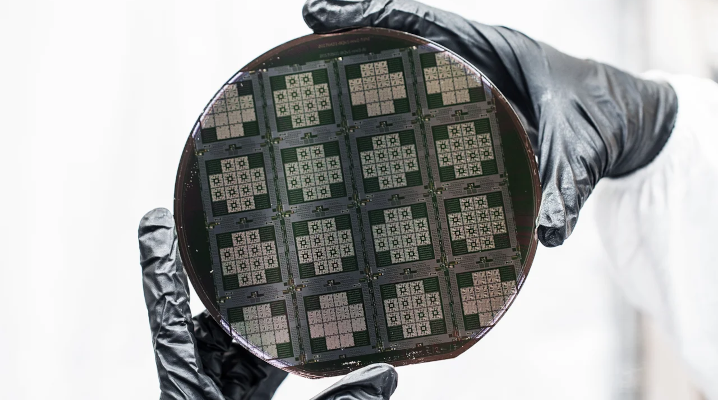 EMERGING TECH
EMERGING TECH
 EMERGING TECH
EMERGING TECH
 EMERGING TECH
EMERGING TECH
Rigetti & Co. Inc. has built what it says is the world’s first commercial quantum processor to feature a multichip design.
The startup today detailed the processor, known as the Aspen-M. In tests carried out by Rigetti, the processor managed to run a quantum algorithm described as too complex to be simulated using classical computers. The startup has also successfully used the Aspen-M to perform a machine learning task.
Berkeley, California-based Rigetti is one of several startups working to develop large-scale quantum computers. It’s currently in the process of going public through a merger with a special-purpose acquisition company.
The newly introduced Aspen-M processor features 80 qubits, the basic building blocks of quantum computers. The processor consists of two separate quantum chips with 40 qubits each. It also includes several other features not found in earlier Rigetti systems, the startup says.
Thanks to the new features, Rigetti says, the Aspen-M offers 250% faster quantum processing times than its previous-generation hardware. The startup is also promising a 50% decrease in readout errors. A readout error is a technical issue that emerges while extracting the results of a computation from a qubit.
Qubit errors are considered to be one of the main obstacles to large-scale quantum computing. The reliability of quantum hardware will have to improve before the technology can be used to carry out complex calculations. As a result, the 50% decrease in readout errors that the Aspen-M provides represents a notable technical milestone.
Rigetti builds its quantum processors from superconducting qubits. A superconducting qubit is a circuit produced using many of the same fabrication methods as standard chips. But there are a number of key technical differences.
Both traditional chips and superconducting qubits represent data using electrons. In a traditional chip, electrons travel between different components one at a time. In quantum computers that use superconducting qubits, electrons travel not one at a time but rather in pairs. That gives rise to quantum mechanical phenomena that can be used to carry out computations.
Rigetti runs its superconducting quantum chips in refrigerators that operate at a temperature near absolute zero. The refrigerators use a combination of liquid helium and sophisticated thermal shields to cool qubits. Each quantum processor is managed by a control system that uses conventional chips to perform tasks such as calibrating qubits and reading out computation results.
In internal tests, Rigetti used its new Aspen-M processor to perform a machine learning task with a dataset from the New York Stock Exchange. The processor had to predict whether the stock market would close higher or lower the next day. Rigetti says that both the Aspen-M and a separate, 40-qubit system it tested demonstrated “quantum processing capabilities competitive with industry standard classical machine learning models.”
Rigetti also had the Aspen-M run a quantum algorithm with 65 variables. The processor completed the task in under five minutes, the startup says. That’s significant because, according to Riggeti, quantum algorithms of the kind used in the test are too complex to be simulated on classical computers.
“With these systems, we’ve reached a critical milestone in the emerging quantum advantage era,” said Rigetti founder and Chief Executive Officer Chad Rigetti. “Our machines are now at a scale and speed where they can process the real-world data sets that underpin high-impact applications. We believe these systems give researchers and enterprises the best platform to pursue quantum advantage on real problems.”
Rigetti detailed its long-term engineering roadmap when it announced plans to go public earlier this year. The startup is aiming to build a 1,000-qubit system by 2024. Two years after that, Rigetti hopes to launch a system with four times as many qubits.
The Aspen-M is currently in private beta, with Rigetti planning to make the processor publicly available during the first quarter of 2022. Customers can access Rigetti Computing’s hardware through a cloud service operated by the startup. Chips from the startup are also available in Amazon Web Services Inc.’s Amazon Braket quantum computing service and Strangeworks Inc.’s Strangeworks Ecosystem offering.
Rigetti is taking what it describes as a full-stack approach to building quantum computers. The startup not only designs quantum chips but also produces them at a dedicated manufacturing facility. Moreover, Rigetti offers software tools that help customers run code on its systems.
Several other companies besides Rigetti, including IBM Corp. and Google LLC, are building quantum computers based on superconducting qubits. IBM recently introduced a 127-qubit chip dubbed Eagle. Like Rigetti Computing, the technology giant has made building multichip quantum computers a priority in its development roadmap.
Support our mission to keep content open and free by engaging with theCUBE community. Join theCUBE’s Alumni Trust Network, where technology leaders connect, share intelligence and create opportunities.
Founded by tech visionaries John Furrier and Dave Vellante, SiliconANGLE Media has built a dynamic ecosystem of industry-leading digital media brands that reach 15+ million elite tech professionals. Our new proprietary theCUBE AI Video Cloud is breaking ground in audience interaction, leveraging theCUBEai.com neural network to help technology companies make data-driven decisions and stay at the forefront of industry conversations.